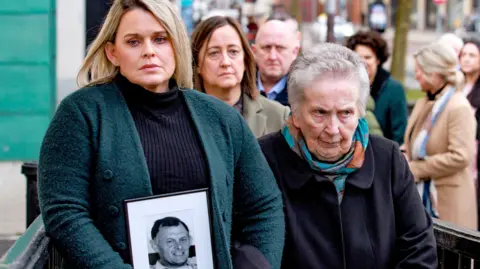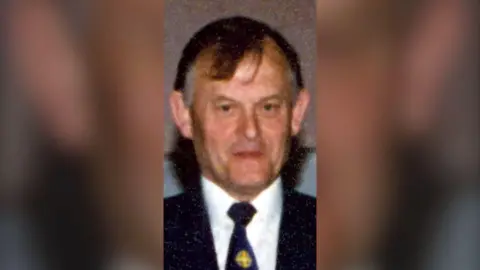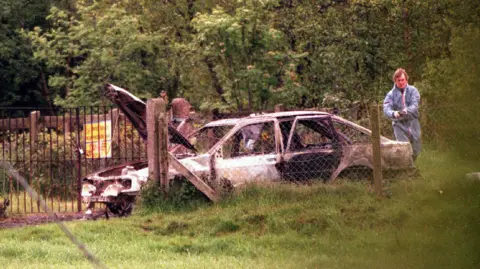Sean Brown's family 'will not give up quest for truth' about murder
 PA Media
PA MediaA public inquiry would "shine a spotlight of truth" into the murder of GAA official Sean Brown, the Court of Appeal in Belfast has heard.
The government has begun a legal challenge which is attempting to overturn a decision by a court to order a public inquiry into the loyalist murder of Mr Brown in 1997.
The claim was made for a lawyer representing Mr Brown's 87-year-old widow, Bridie, who was in court on Thursday.
Intelligence material has linked state agents to the 61-year-old's killing.
Mrs Brown's lawyer said the murder left an "indelible stain on the body politic of the state" and that almost three decades later, the truth "remains hidden" from his widow.
He said while the killers have escaped justice, the full circumstances of the murder must now be examined in a public inquiry.
 Pacemaker Press
Pacemaker PressThe lawyer added that the government's refusal to do so would amount to "presiding over illegality".
The case was heard before three judges at the Court of Appeal in Belfast.
Mr Brown's family was accompanied to the hearing by the Sinn Féin vice president, Michelle O'Neill, and Clare Hanna, the SDLP leader.
Speaking after Thursday's hearing, Mr Brown's daughter Clare Loughran said the family had been to court 57 times over her father's killing.
"All we want to do is get to the truth," she said.
"We have endured an awful lot over the last 28 years and we're not going to give up at this stage."
She called on the Northern Ireland secretary to "do the right thing" and let a public inquiry proceed.
The family's solicitor Niall Murphy said that nothing said in court on Thursday would alter the view that a public inquiry must be held and that he "looks forward" to the court's judgement.
'No viable alternative'
Mr Brown was shot dead by the Loyalist Volunteer Force (LVF) near Randalstown after being abducted as he locked the gates of the Bellaghy Wolfe Tones GAA club.
Last December, a judge ordered a public inquiry - a move the Brown family welcomed.
He said the government was in breach of a human rights obligation to investigate, and there was "no viable alternative" to an inquiry.
However, the government believes Mr Brown's murder can be investigated by the Independent Commission for Reconciliation and Information Recovery (ICRIR).
 Pacemaker Press
Pacemaker PressIt has pledged further reforms to the ICRIR.
A lawyer acting for Secretary of State Hilary Benn argued the judge who made the public inquiry ruling had "fallen into legal error."
He said it involved "very difficult constitutional territory", resulting in a decision "which is classically for ministers to make, not the courts".
The lawyer representing Mr Benn and the government went on to suggest that ordering the public inquiry was premature, insisting the secretary of state remained committed to making the ICRIR compliant with human rights laws - either by legislative changes or by successfully challenging the separate court judgement covering the ICRIR.
He said the judge who ordered the public inquiry should have adjourned the case until the outcome of the appeal over the ICRIR's compliance with human rights law ran its course.
He claimed the ICRIR would be made human rights compliant "by hook or by crook" and it could then deal with the Brown case "faster and cheaper" than any public inquiry.
Earlier, campaigners, including families who lost loved ones during the Troubles, held a demonstration outside the High Court in Belfast in solidarity with the family of Mr Brown.
Judgement was reserved and will be delivered on a later date.
